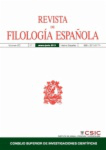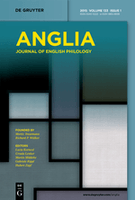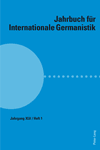
Academic Journal of Modern Philology
Scope & Guideline
Catalyzing Scholarly Engagement in Philology
Introduction
Aims and Scopes
- Interdisciplinary Literary Studies:
The journal focuses on the intersection of literature with other fields such as linguistics, cultural studies, and history, encouraging a comprehensive analysis of texts within their socio-cultural contexts. - Cultural and Linguistic Analysis:
Research often explores the role of language in shaping cultural identities, reflecting on how linguistic practices inform literary production and reception across different communities. - Modern and Historical Perspectives:
The journal publishes works that examine both contemporary and historical texts, allowing for a comparative analysis of literary trends and cultural shifts over time. - Translation Studies:
A significant emphasis is placed on translation as a critical area of study, addressing the complexities of translating literature across linguistic and cultural boundaries. - Digital Humanities:
The journal is increasingly integrating digital methodologies in philological research, exploring how digital tools can enhance literary analysis and broaden access to texts.
Trending and Emerging
- Digital Humanities and Textual Analysis:
There is a notable increase in research utilizing digital tools for textual analysis, reflecting the growing importance of technology in humanities research and the analysis of large corpora of texts. - Intercultural Communication and Identity:
Themes surrounding intercultural communication, identity, and diversity are gaining prominence, as scholars investigate how literature and language shape and reflect the complexities of identity in a globalized world. - Gender Studies and Feminist Literary Criticism:
Research focusing on gender representation, feminist perspectives, and the intersectionality of gender with literature is on the rise, indicating a broader societal engagement with issues of gender and identity. - Environmental Literature and Eco-Criticism:
An emerging interest in environmental themes and eco-criticism reflects a growing awareness of ecological issues, as literature is increasingly seen as a medium for exploring human relationships with nature. - Multimodal and Visual Literacies:
There is a trend towards examining multimodal texts and visual literacies, acknowledging the impact of visual culture on literature and the importance of integrating visual analysis into literary studies.
Declining or Waning
- Traditional Literary Criticism:
There seems to be a diminishing focus on traditional literary criticism methods, which often prioritize canonical texts and established critical frameworks, as newer, more interdisciplinary approaches gain traction. - Historical Linguistics:
Research centered solely on historical linguistics is less frequently featured, possibly overshadowed by contemporary linguistic applications and sociolinguistic studies that engage with current language use. - Classical Literature:
The exploration of classical literature appears to be waning, as the journal shifts more towards modern and contemporary works that resonate with current social and cultural issues. - Single Author Studies:
Papers focusing exclusively on single author analyses are becoming less common, as the trend moves towards comparative studies and thematic explorations that encompass multiple voices and perspectives.
Similar Journals

REVISTA DE FILOLOGIA ESPANOLA
Fostering Academic Dialogue in Spanish PhilologyREVISTA DE FILOLOGIA ESPANOLA is a distinguished academic journal dedicated to the fields of linguistics and literature, published by the CONSEJO SUPERIOR INVESTIGACIONES CIENTIFICAS (CSIC) since 1954, and has been an Open Access journal since its inception. Situated in Madrid, Spain, this journal has emerged as a crucial platform for the dissemination of scholarly research, with notable rankings including Q2 in Linguistics and Language and Q1 in Literature and Literary Theory as of 2023. The journal's commitment to fostering academic dialogue is reflected in its impressive Scopus rankings, including a 79th percentile in the Arts and Humanities for Literature and Literary Theory. Covering a wide range of topics from linguistic theory to literary critique, REVISTA DE FILOLOGIA ESPANOLA is essential reading for researchers, professionals, and students alike, providing valuable insights and cutting-edge research in the ever-evolving landscape of Spanish philology.

Skandinavskaya Filologiya
Unveiling the Rich Tapestry of Scandinavian Heritage.Skandinavskaya Filologiya is a distinguished academic journal published by St Petersburg University Press that specializes in Scandinavian philology and linguistics. With its ISSN 0202-2397 and E-ISSN 2618-9518, this journal serves as a vital platform for scholarly articles that explore the intricate languages, literature, and cultural nuances of the Scandinavian region. The journal seeks to promote interdisciplinary research and foster collaboration among linguists, literary scholars, and cultural researchers interested in the rich heritage and contemporary developments within Scandinavian studies. Although the journal operates without open access, it is committed to enhancing academic discourse and providing a valuable resource for students, professionals, and researchers. Located in the vibrant city of St Petersburg, Russia, the journal aims to bridge the gap between Eastern and Western scholarship in Scandinavian philology, making it a significant contributor to the field.

Studi Slavistici
Fostering Innovative Perspectives in Cultural StudiesStudi Slavistici is an esteemed academic journal published by FIRENZE UNIV PRESS, focusing on the rich and diverse fields of Cultural Studies, Linguistics and Language, and Literature and Literary Theory. Since its initiation in 2004, it operates under an Open Access model, providing unrestricted access to its contents and fostering a wider dissemination of research. Based in Italy, this journal serves as a vital platform for scholars and researchers engaged in Slavic studies and beyond, encouraging interdisciplinary dialogue and innovative approaches. With its current Quartile rankings in the Q4 category across various domains, it plays a significant role in shaping dialogues within the academic community while offering insights into contemporary and historical perspectives. By maintaining an inclusive vision and engaging with critical issues, Studi Slavistici remains dedicated to advancing knowledge and scholarship in these intricate fields.

ANGLIA-ZEITSCHRIFT FUR ENGLISCHE PHILOLOGIE
Charting New Territories in Philological StudiesANGLIA-ZEITSCHRIFT FUR ENGLISCHE PHILOLOGIE, published by WALTER DE GRUYTER GMBH, stands as a significant periodical in the fields of Linguistics and Literary Theory. With a rich publication history dating back to 1878 and ongoing contributions until 2024, this esteemed journal serves as a vital resource for researchers, professionals, and students interested in the evolution of the English language and literature. Although it does not currently offer open access, its rigorous peer-reviewed articles have secured a respectable standing, ranking Q3 in Linguistics and Language and Q2 in Literature and Literary Theory as of 2023. The journal, located in Berlin, Germany, continues to drive academic discourse and foster scholarly engagement in the intricacies of English philology, making it an essential platform for the latest research and developments in the field.

Lingue Antiche e Moderne
Unlocking the Secrets of Language EvolutionLingue Antiche e Moderne is an esteemed open-access academic journal dedicated to the study of ancient and modern languages, published by UNIV STUDI UDINE. Since its inception in 2012, the journal has provided a platform for researchers, professionals, and students to disseminate groundbreaking studies and interdisciplinary research in linguistics and philology. With a commitment to accessibility, Lingue Antiche e Moderne encourages the sharing of knowledge across a global audience, ensuring that innovative ideas and historical insights are readily available to all. The journal plays a crucial role in advancing our understanding of linguistic evolution and cultural interchange, making it a vital resource for anyone interested in the dynamics of language through time. The ISSN for the journal is 2281-4841, ensuring its recognition in the academic community. Researchers and contributors are invited to engage with this vibrant discourse while enriching their own scholarly endeavors.

Caplletra
Bridging Academia and Accessibility in Language ResearchCaplletra is a distinguished open-access journal dedicated to the field of linguistics and language studies, published by PUBL ABADIA MONTSERRAT since its inception. Based in Barcelona, Spain, this journal has been a vital resource for researchers, professionals, and students engaged in the intricate explorations of language and its applications since its transition to open access in 2005. Despite its current quartile ranking of Q4 within the Linguistics and Language category as of 2023, Caplletra continues to serve as an inclusive platform, fostering a dialogue that encourages a diverse range of scholarly contributions. Covering an expansive scope in the converged years from 2018 to 2024, it plays a crucial role in disseminating innovative research and insights. With its ISSN 0214-8188 and E-ISSN 2386-7159, Caplletra is committed to making academic work accessible to all, enhancing the landscape of linguistic scholarship and reflecting the evolving nature of language studies.

Studia Universitatis Babes-Bolyai Philologia
Empowering Global Dialogue in Linguistics and LiteratureWelcome to Studia Universitatis Babes-Bolyai Philologia, a distinguished journal published by UNIV BABES-BOLYAI, which has proudly embraced Open Access since 2021. With an ISSN of 1220-0484 and an E-ISSN of 2065-9652, this journal serves as a vital platform for scholars in the field of philology, offering a rich repository of contemporary research and innovative thought. Hailing from the vibrant academic community of Cluj-Napoca, Romania, the journal aims to foster interdisciplinary dialogue and promote cutting-edge studies that explore linguistic, literary, and cultural dynamics across the globe. By providing unrestricted access to its content, Studia Universitatis Babes-Bolyai Philologia ensures that vital research is available to a worldwide audience, empowering researchers, professionals, and students to engage with and contribute to the ever-evolving discourse in philological studies.

Naslede
Bridging local insights with global scholarship.Naslede is a distinguished scholarly journal published by the University of Kragujevac, Faculty of Philology and Arts. With an ISSN and E-ISSN of 1820-1768, it serves as a vital platform for the dissemination of research in the fields of philology, arts, and cultural studies. The journal aspires to foster academic dialogue and scholarly exchange, providing researchers, professionals, and students with access to high-quality, peer-reviewed articles that explore the intersections of language, literature, and artistic expression. While it currently does not offer open access options, the significance of Naslede within its field cannot be overstated, as it contributes to the broader academic community by highlighting innovative research and emerging trends in the humanities. Located in Kragujevac, Serbia, the journal is positioned to bridge local and international scholarship, making it an essential resource for those dedicated to advancing knowledge in these disciplines.

Listy Filologicke
Cultivating a Nexus for Innovative Academic Exploration.Listy Filologicke is a distinguished academic journal published by the Institute of Classical Studies at the Academy of Sciences of the Czech Republic, focusing on the interdisciplinary fields of History, Linguistics and Language, and Literature and Literary Theory. With an ISSN of 0024-4457 and an E-ISSN of 2570-9410, this journal has been a pivotal platform for scholarly discourse since its convergence years began in 2003. Notably, it holds a Q3 classification in History and Linguistics and Language, and a Q2 in Literature and Literary Theory as of 2023. Its rankings within Scopus illustrate its relevance and impact in academia, with noteworthy positions in the Arts and Humanities and Social Sciences categories. Researchers, professionals, and students will find Listy Filologicke an invaluable resource for exploring cutting-edge research, critical analyses, and discourse that contribute significantly to their respective fields. Based in the heart of the Czech Republic, it continues to promote scholarly excellence and foster international collaboration.

JAHRBUCH FUR INTERNATIONALE GERMANISTIK
Pioneering Insights into Language and Cultural ContextsJAHRBUCH FUR INTERNATIONALE GERMANISTIK is a prominent academic journal published by VERLAG PETER LANG AG, dedicated to advancing research in the fields of German studies, literature, and linguistics. With its ISSN 0449-5233 and E-ISSN 2235-1280, this journal provides a platform for scholarly discourse, critical analysis, and innovative studies related to German language and literary theory. Although its coverage in Scopus was discontinued in 2014, the journal continues to be influential within the academic community, evidenced by its rankings in the Arts and Humanities and Social Sciences categories. Specifically, it holds a rank of #397 in Literature and Literary Theory and #477 in Language and Linguistics, reflecting a solid presence among peers. Researchers and students alike can benefit from its insightful articles that delve into various dimensions of Germanistik, thereby fostering a greater understanding of language and cultural contexts. For those interested in contributing to this field of study, JAHRBUCH FUR INTERNATIONALE GERMANISTIK serves as an essential resource for high-quality scholarly content.